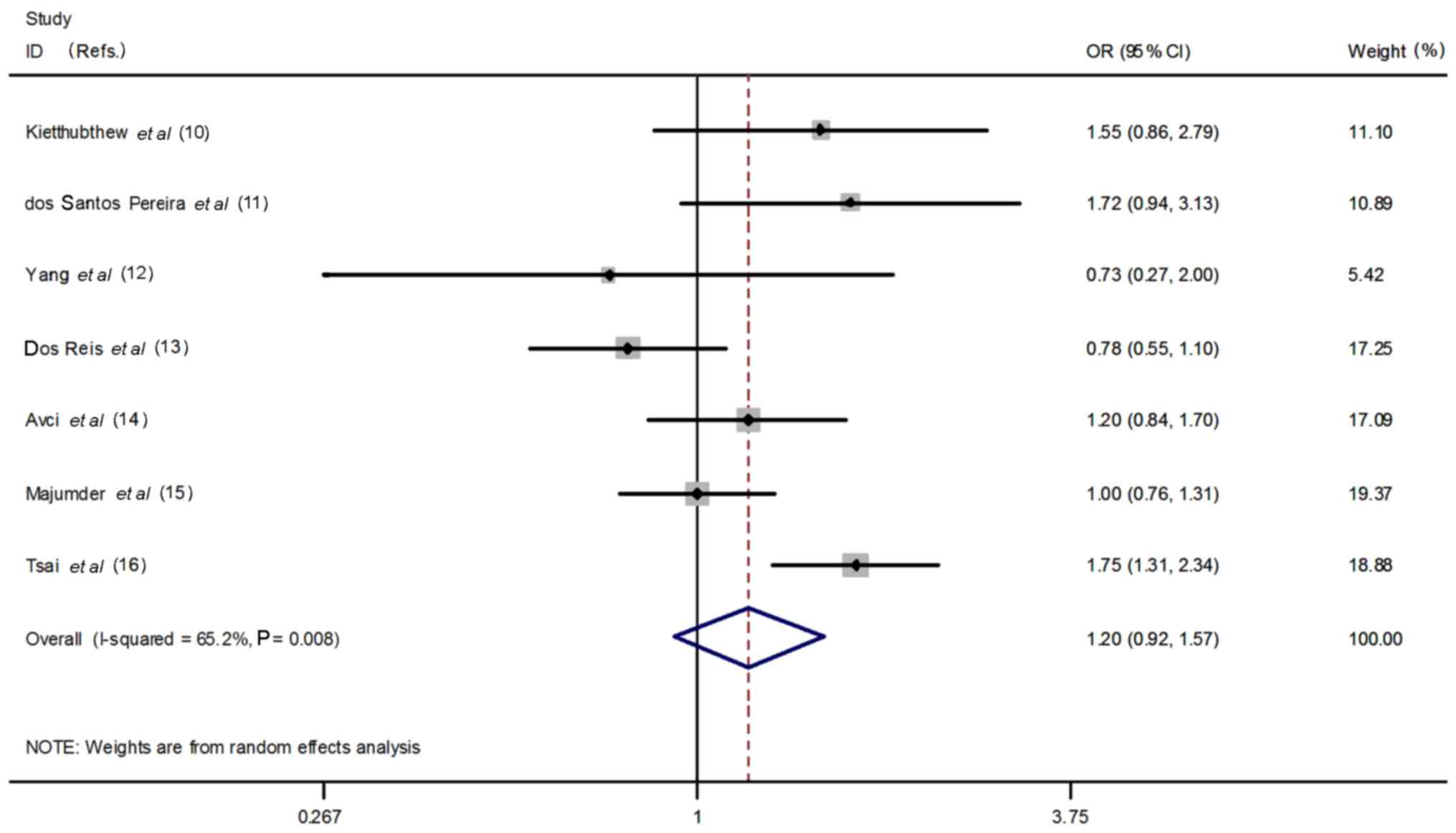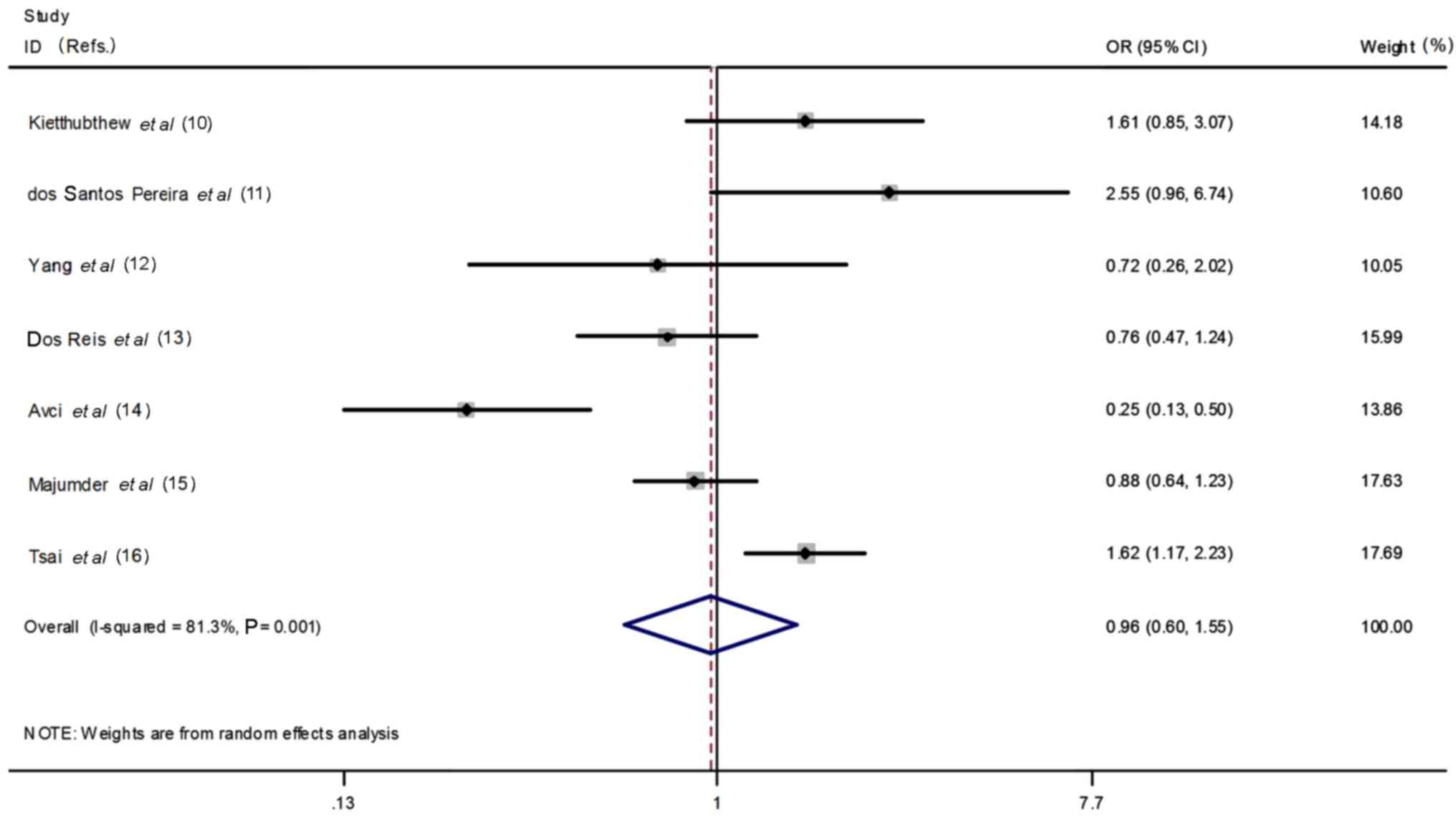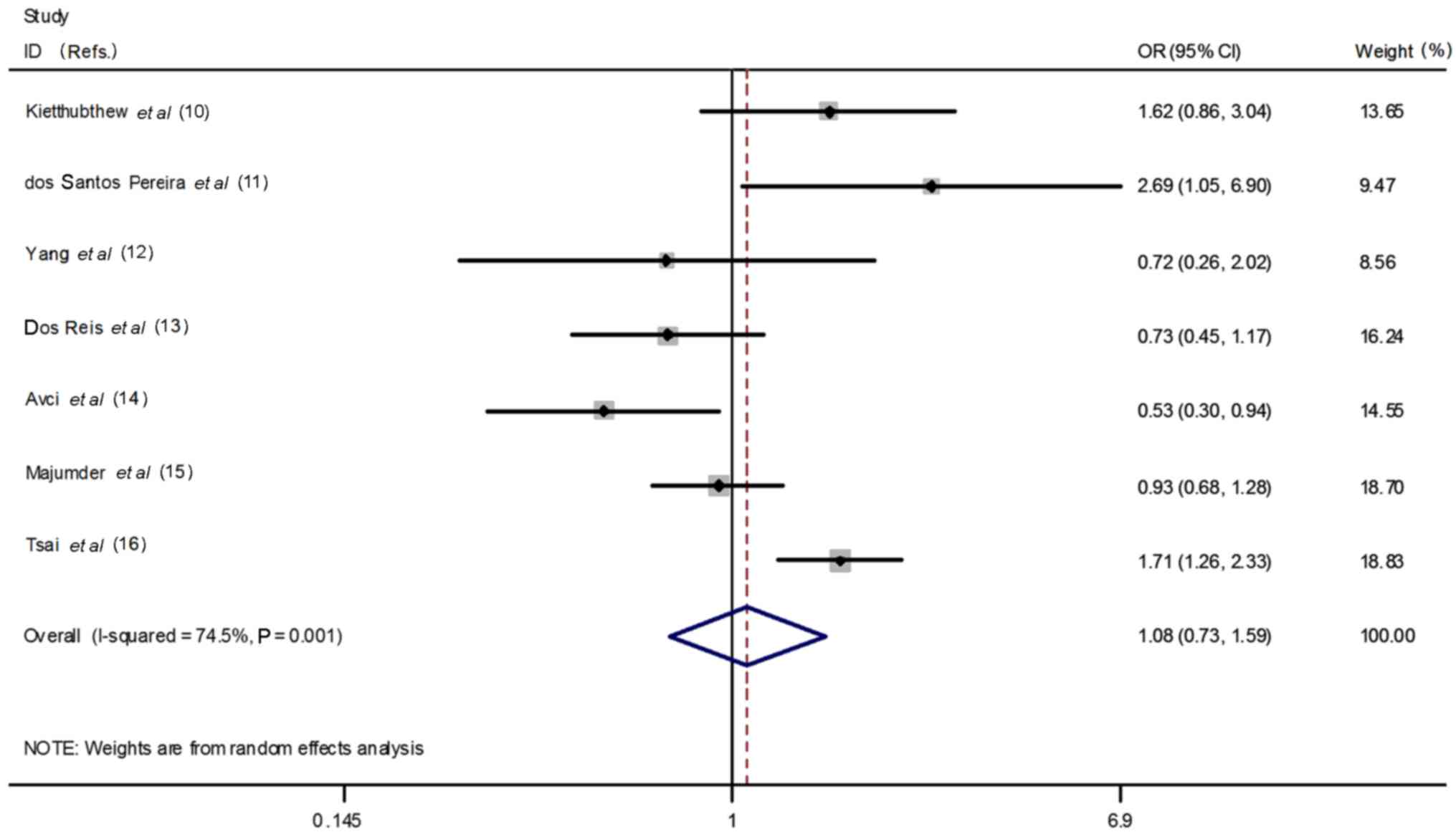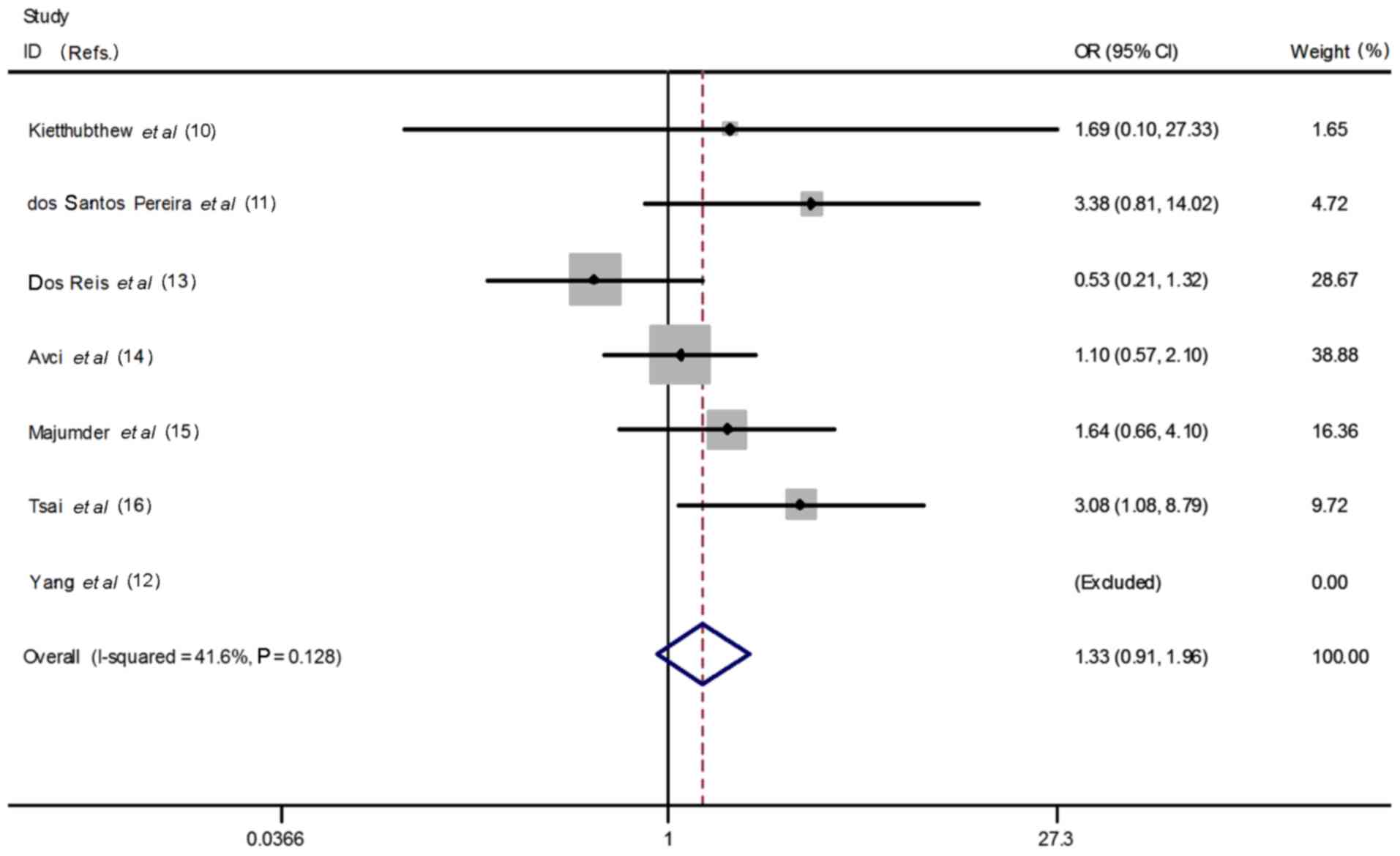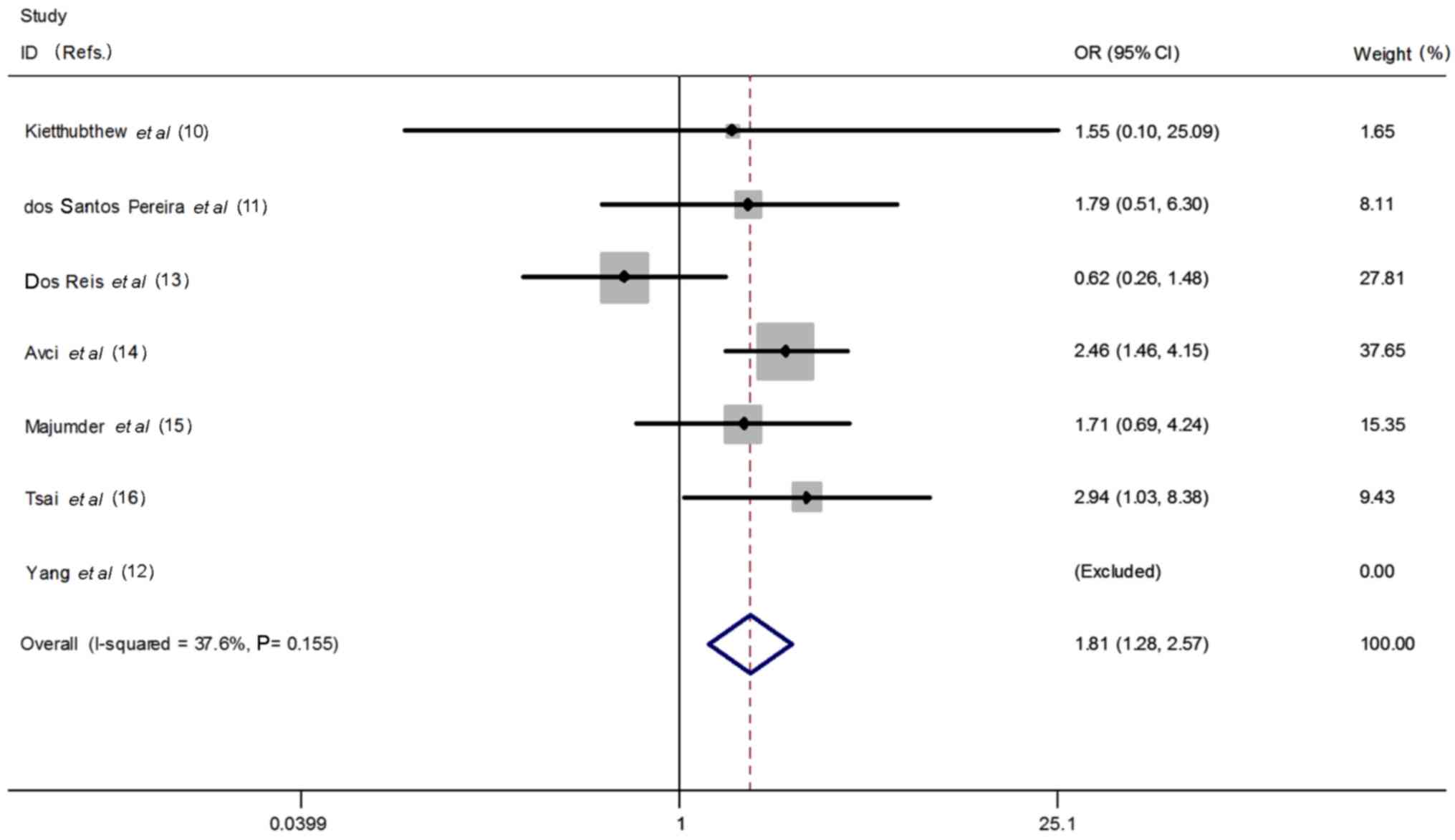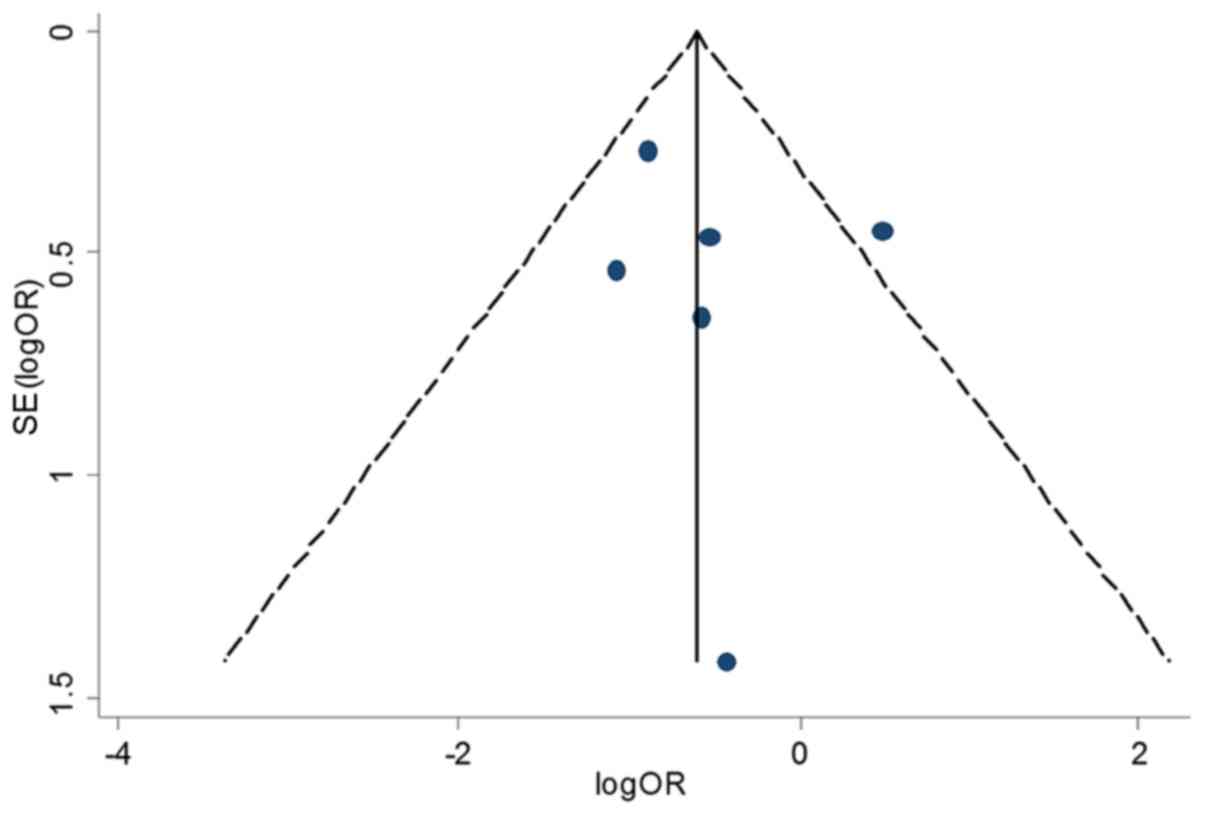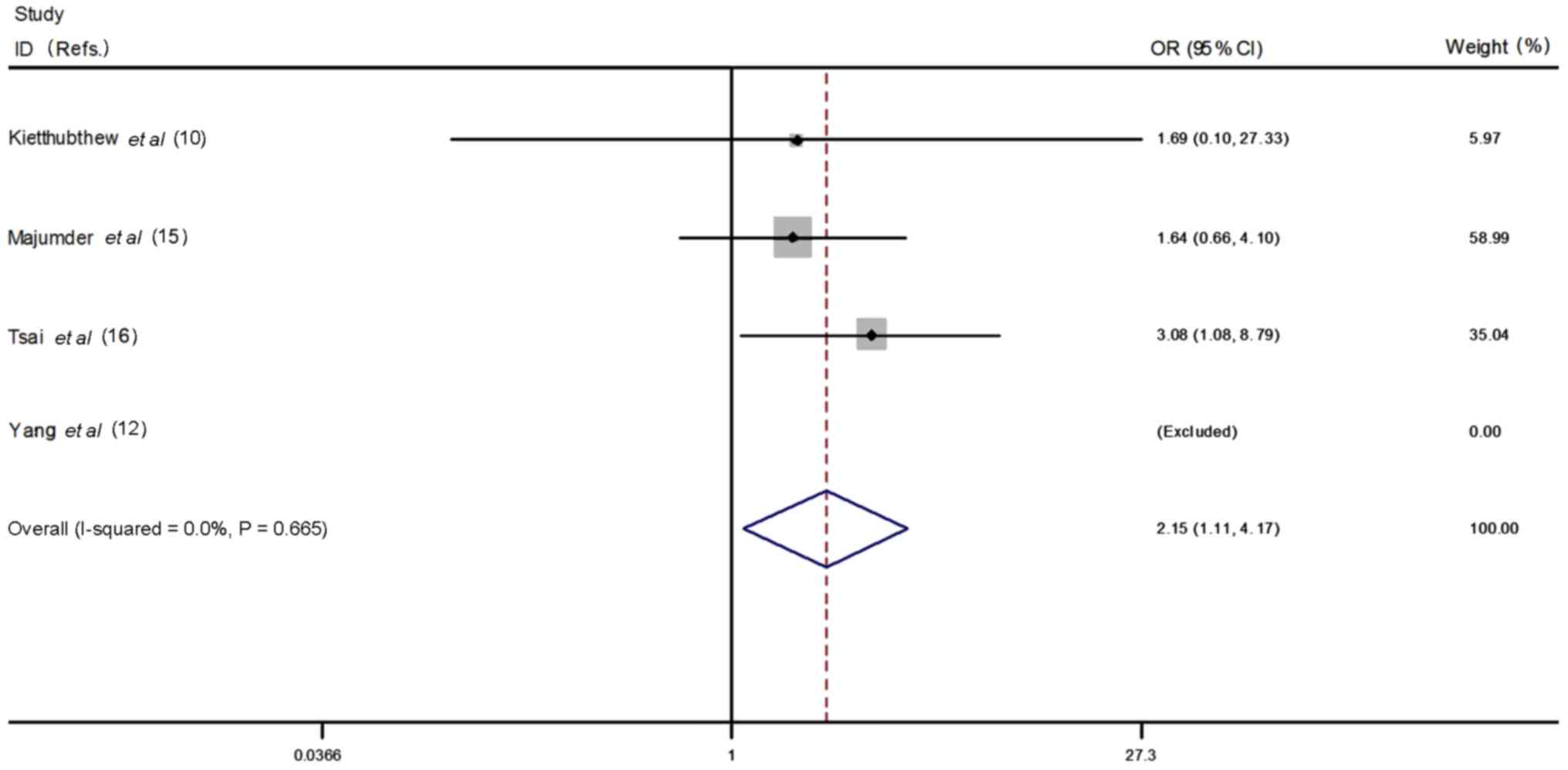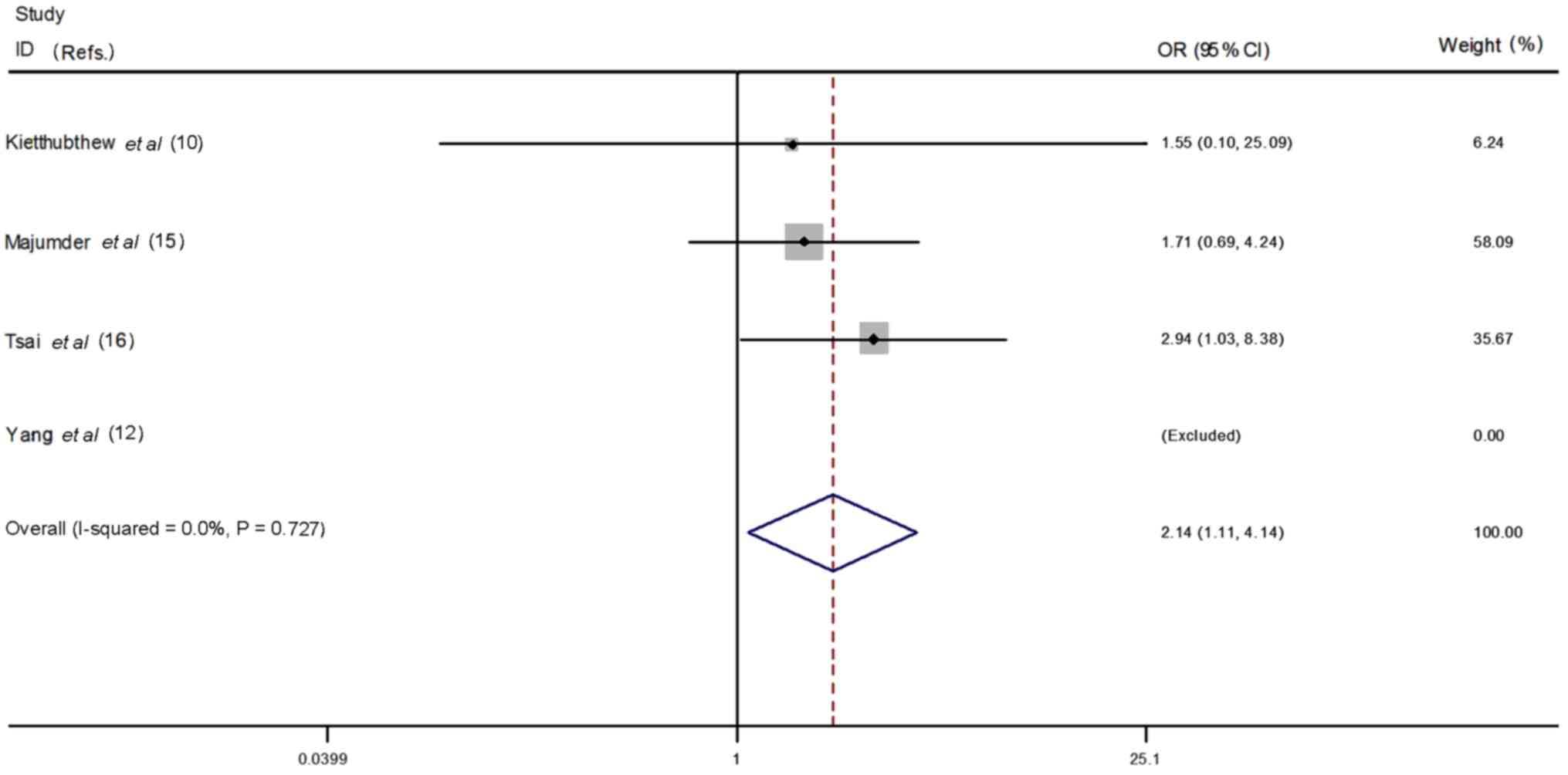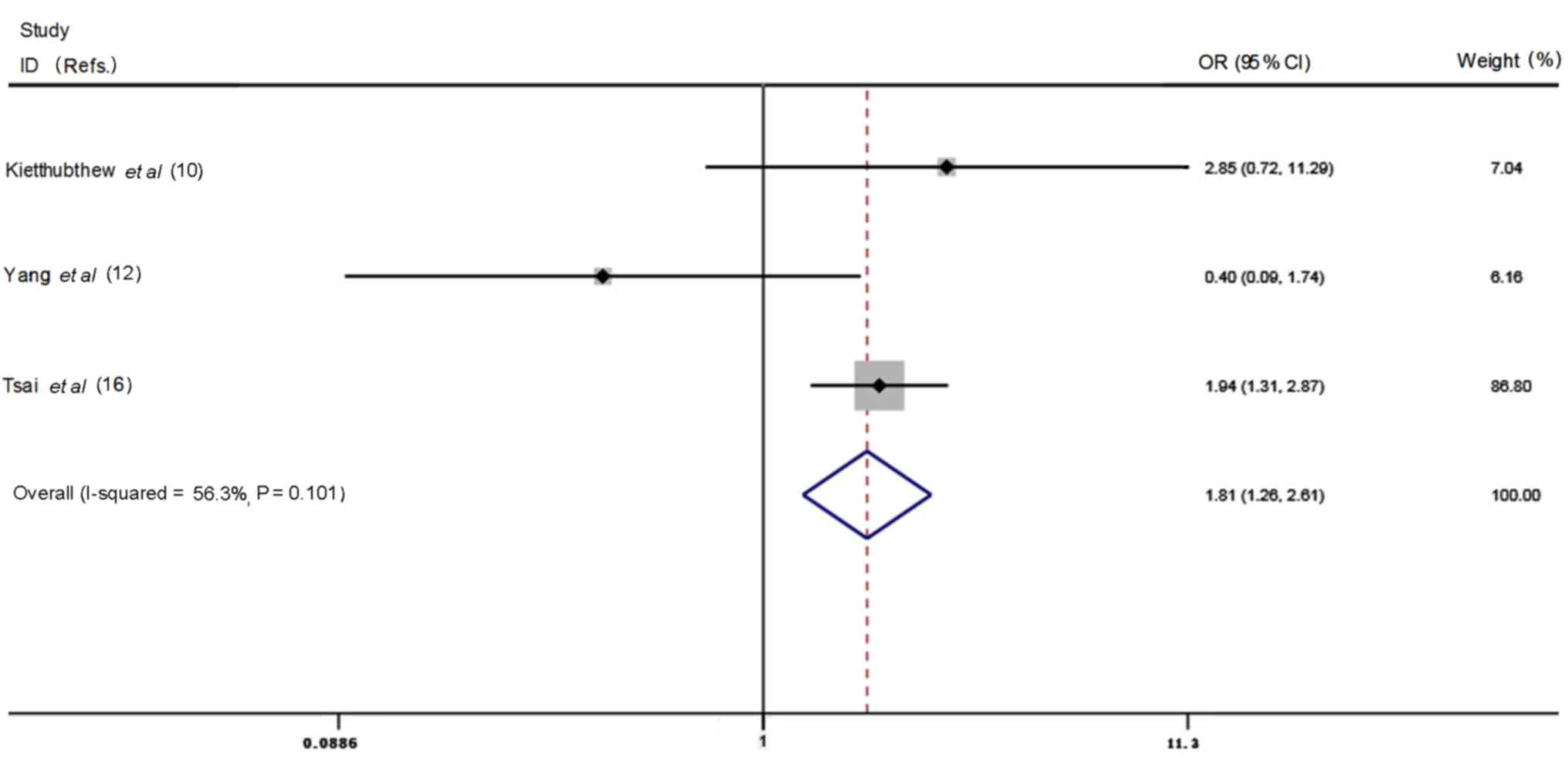|
1
|
Ferlay J, Soerjomataram I, Dikshit R, Eser
S, Mathers C, Rebelo M, Parkin DM, Forman D and Bray F: Cancer
incidence and mortality worldwide: Sources, methods and major
patterns in GLOBOCAN 2012. Int J Cancer. 136:E359–E386. 2015.
View Article : Google Scholar : PubMed/NCBI
|
|
2
|
Chaturvedi AK, Anderson WF,
Lortet-Tieulent J, Curado MP, Ferlay J, Franceschi S, Rosenberg PS,
Bray F and Gillison ML: Worldwide trends in incidence rates for
oral cavity and oropharyngeal cancers. J Clin Oncol. 31:4550–4559.
2013. View Article : Google Scholar : PubMed/NCBI
|
|
3
|
GBD 2013 Mortality and Causes of Death
Collaborators: Global, regional, and national age-sex specific
all-cause and cause-specific mortality for 240 causes of death,
1990–2013: A systematic analysis for the Global Burden of Disease
Study 2013. Lancet. 385:117–171. 2015. View Article : Google Scholar : PubMed/NCBI
|
|
4
|
Chen MK, Chiou HL, Su SC, Chung TT, Tseng
HC, Tsai HT and Yang SF: The association between hypoxia inducible
factor-1alpha gene polymorphisms and increased susceptibility to
oral cancer. Oral Oncol. 45:e222–e226. 2009. View Article : Google Scholar : PubMed/NCBI
|
|
5
|
Sugimura T, Kumimoto H, Tohnai I, Fukui T,
Matsuo K, Tsurusako S, Mitsudo K, Ueda M, Tajima K and Ishizaki K:
Gene-environment interaction involved in oral carcinogenesis:
Molecular epidemiological study for metabolic and DNA repair gene
polymorphisms. J Oral Pathol Med. 35:11–18. 2006. View Article : Google Scholar : PubMed/NCBI
|
|
6
|
Risch N and Merikangas K: The future of
genetic studies of complex human diseases. Science. 273:1516–1517.
1996. View Article : Google Scholar : PubMed/NCBI
|
|
7
|
Bănescu C, Tilinca M, Benedek EL, Demian
S, Macarie I, Duicu C and Dobreanu M: XRCC3 Thr241Met polymorphism
and risk of acute myeloid leukemia in a Romanian population. Gene.
526:478–483. 2013. View Article : Google Scholar : PubMed/NCBI
|
|
8
|
Yang L, An Y, Wang G, Lu T and Yang S:
Association between XRCC3 Thr241Met polymorphism and risk of
osteosarcoma in a Chinese population. Int J Clin Exp Pathol.
8:11670–11674. 2015.PubMed/NCBI
|
|
9
|
Michalska MM, Samulak D, Romanowicz H,
Jabłoński F and Smolarz B: Association between single nucleotide
polymorphisms (SNPs) of XRCC2 and XRCC3 homologous recombination
repair genes and ovarian cancer in Polish women. Exp Mol Pathol.
100:243–247. 2016. View Article : Google Scholar : PubMed/NCBI
|
|
10
|
Kietthubthew S, Sriplung H, Au WW and
Ishida T: Polymorphism in DNA repair genes and oral squamous cell
carcinoma in Thailand. Int J Hyg Environ Health. 209:21–29. 2006.
View Article : Google Scholar : PubMed/NCBI
|
|
11
|
dos Santos Pereira J, Fontes FL, de
Medeiros SR, de Almeida Freitas R, de Souza LB and da Costa Miguel
MC: Association of the XPD and XRCC3 gene polymorphisms with oral
squamous cell carcinoma in a Northeastern Brazilian population: A
pilot study. Arch Oral Biol. 64:19–23. 2016. View Article : Google Scholar : PubMed/NCBI
|
|
12
|
Yang CH, Lin YD, Yen CY, Chuang LY and
Chang HW: A systematic gene-gene and gene-environment interaction
analysis of DNA repair genes XRCC1, XRCC2, XRCC3, XRCC4, and oral
cancer risk. OMICS. 19:238–247. 2015. View Article : Google Scholar : PubMed/NCBI
|
|
13
|
Dos Reis MB, Losi-Guembarovski R, de Souza
Fonseca Ribeiro EM, Cavalli IJ, Morita MC, Ramos GH, de Oliveira
BV, Mizuno LT, Rogatto SR and de Syllos Cólus IM: Allelic variants
of XRCC1 and XRCC3 repair genes and susceptibility of oral cancer
in Brazilian patients. J Oral Pathol Med. 42:180–185. 2013.
View Article : Google Scholar : PubMed/NCBI
|
|
14
|
Avci H, Ergen A, Bireller ES, Ertugrul B
and Cakmakoglu B: A strong relationship between oral squamous cell
carcinoma and DNA repair genes. Biochem Genet. 55:378–386. 2017.
View Article : Google Scholar : PubMed/NCBI
|
|
15
|
Majumder M, Sikdar N, Paul RR and Roy B:
Increased risk of oral leukoplakia and cancer among mixed tobacco
users carrying XRCC1 variant haplotypes and cancer among smokers
carrying two risk genotypes: One on each of two loci, GSTM3 and
XRCC1 (Codon 280). Cancer Epidemiol Biomarkers Prev. 14:2106–2112.
2005. View Article : Google Scholar : PubMed/NCBI
|
|
16
|
Tsai CW, Chang WS, Liu JC, Tsai MH, Lin CC
and Bau DT: Contribution of DNA double-strand break repair gene
XRCC3 genotypes to oral cancer susceptibility in Taiwan. Anticancer
Res. 34:2951–2956. 2014.PubMed/NCBI
|
|
17
|
Leemans CR, Braakhuis BJ and Brakenhoff
RH: The molecular biology of head and neck cancer. Nat Rev Cancer.
11:9–22. 2011. View
Article : Google Scholar : PubMed/NCBI
|
|
18
|
Werbrouck J, De Ruyck K, Duprez F,
Veldeman L, Claes K, Van Eijkeren M, Boterberg T, Willems P, Vral
A, De Neve W, et al: Acute normal tissue reactions in head-and-neck
cancer patients treated with IMRT: Influence of dose and
association with genetic polymorphisms in DNA DSB repair genes. Int
J Radiat Oncol Biol Phys. 73:1187–1195. 2009. View Article : Google Scholar : PubMed/NCBI
|
|
19
|
da Silva BS, Rovaris DL, Bonotto RM, Meyer
JB, Grohe RE, Perassolo MS, Palazzo RP, Maluf SW, Linden R and de
Andrade FM: The influence on DNA damage of glycaemic parameters,
oral antidiabetic drugs and polymorphisms of genes involved in the
DNA repair system. Mutagenesis. 28:525–530. 2013. View Article : Google Scholar : PubMed/NCBI
|
|
20
|
Chang WS, Tsai CW, Wang JY, Ying TH, Hsiao
TS, Chuang CL, Yueh TC, Liao CH, Hsu CM, Liu SP, et al:
Contribution of X-ray repair complementing defective repair in
Chinese hamster cells 3 (XRCC3) genotype to leiomyoma risk.
Anticancer Res. 35:4691–4696. 2015.PubMed/NCBI
|
|
21
|
Manuguerra M, Saletta F, Karagas MR,
Berwick M, Veglia F, Vineis P and Matullo G: XRCC3 and XPD/ERCC2
single nucleotide polymorphisms and the risk of cancer: A HuGE
review. Am J Epidemiol. 164:297–302. 2006. View Article : Google Scholar : PubMed/NCBI
|
|
22
|
Werbrouck J, De Ruyck K, Duprez F, Van
Eijkeren M, Rietzschel E, Bekaert S, Vral A, De Neve W and Thierens
H: Single-nucleotide polymorphisms in DNA double-strand break
repair genes: Association with head and neck cancer and interaction
with tobacco use and alcohol consumption. Mutat Res. 656:74–81.
2008. View Article : Google Scholar : PubMed/NCBI
|
|
23
|
Au WW, Salama SA and Sierra-Torres CH:
Functional characterization of polymorphisms in DNA repair genes
using cytogenetic challenge assays. Environ Health Perspect.
111:1843–1850. 2003. View
Article : Google Scholar : PubMed/NCBI
|
|
24
|
Tan DJ, Chang J, Chen WL, Agress LJ, Yeh
KT, Wang B and Wong LJ: Novel heteroplasmic frameshift and missense
somatic mitochondrial DNA mutations in oral cancer of betel quid
chewers. Genes Chromosomes Cancer. 37:186–194. 2003. View Article : Google Scholar : PubMed/NCBI
|
|
25
|
Chen CL, Chi CW and Liu TY: Hydroxyl
radical formation and oxidative DNA damage induced by areca quid in
vivo. J Toxicol Environ Health A. 65:327–336. 2002. View Article : Google Scholar : PubMed/NCBI
|
|
26
|
Zhang EJ, Cui ZG, Xu ZF, Duan WY, Huang
SH, Tan XX, Yin ZH, Sun CF and Lu L: Lack of influence of an XRCC3
gene polymorphism on oral cancer susceptibility: Meta-analysis.
Asian Pac J Cancer Prev. 15:10329–10334. 2014. View Article : Google Scholar : PubMed/NCBI
|
|
27
|
Benhamou S, Tuimala J, Bouchardy C, Dayer
P, Sarasin A and Hirvonen A: DNA repair gene XRCC2 and XRCC3
polymorphisms and susceptibility to cancers of the upper
aerodigestive tract. Int J Cancer. 112:901–904. 2004. View Article : Google Scholar : PubMed/NCBI
|















